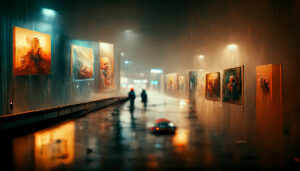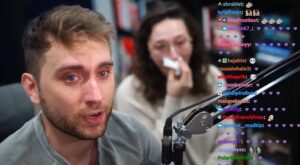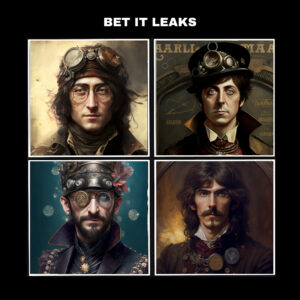Both The Beatles and The Rolling Stones are revered by music fans, even long after half a century. However, one of the things many love about The Beatles is that their output was a finite quantity. They went out before they were shown out.
Advances in artificial intelligence (AI), however, suggest that the well will not remain dry much longer. In the same manner that AI art programs like Dall-E and Midjourney train on art and photos in multitudes, audio technologies are already synthesizing new compositions from old – even dead – creators.
 The naysayers will predictably say “nay” and insist the nuance of the human hand cannot be duplicated, neither figuratively nor literally. This is partially true. As stunning as some AI art programs are, these still have severe limitations, specifically when it comes to rendering hands. Often, hands are represented as twisted, multi-jointed things or three-fingered claws, even as faces grow ever more indistinguishable from celebrity photographs. But that’s the nature of AI. It keeps getting better, and eventually the eldritch horrors being spat out will be replaced by an artificial perfection. Note again that faces from these same technologies only two years ago were grotesque traumas. The advances we’ve seen are relatively fast and stunning.
The naysayers will predictably say “nay” and insist the nuance of the human hand cannot be duplicated, neither figuratively nor literally. This is partially true. As stunning as some AI art programs are, these still have severe limitations, specifically when it comes to rendering hands. Often, hands are represented as twisted, multi-jointed things or three-fingered claws, even as faces grow ever more indistinguishable from celebrity photographs. But that’s the nature of AI. It keeps getting better, and eventually the eldritch horrors being spat out will be replaced by an artificial perfection. Note again that faces from these same technologies only two years ago were grotesque traumas. The advances we’ve seen are relatively fast and stunning.
And then there’s audio. During the 2022 miniseries Obi-Wan Kenobi, a very memorable vocal performance from James Earl Jones as Darth Vader was essentially an elaborate deepfake. Since then, Jones has sold his version of Vader’s voice to Disney, to be used in perpetuity, even long after he passes away. On the positive side, Jones had the ability to do so, of his own accord.
 This is not true of most deepfake technology, leading to allegations of abuse that are morally and legally troubling. Streamer Brandon Ewing, known as Atrioc on Twitch, was caught on a stream with his desktop showing, and in it was a video of another streamer whose face was deepfaked into pornography. It was later learned that Atrioc had done this with the faces of many streaming colleagues, none of which wanted, consented, or even knew of this. This is a disturbing new wrinkle in the war of identity theft, and with many platforms touting easy and cheap apps to do this sort of thing, anyone could be digitally inserted into media they may not ever condone. These are present – not future – crimes.
This is not true of most deepfake technology, leading to allegations of abuse that are morally and legally troubling. Streamer Brandon Ewing, known as Atrioc on Twitch, was caught on a stream with his desktop showing, and in it was a video of another streamer whose face was deepfaked into pornography. It was later learned that Atrioc had done this with the faces of many streaming colleagues, none of which wanted, consented, or even knew of this. This is a disturbing new wrinkle in the war of identity theft, and with many platforms touting easy and cheap apps to do this sort of thing, anyone could be digitally inserted into media they may not ever condone. These are present – not future – crimes.
 Back to The Beatles. AI can create something from nothing, visually and audibly. Bach concertos are being synthesized just from machine learning and previous recorded performances. The music of The Beatles is some of the most famous ever created, and don’t forget decades of additional recordings from its members. Plus, there is an innate desire of most humans as they age to stay with the media of their youth, rejecting and criticizing anything new. This is a potential nexus point where all that was unique and “human” about art will be reconstructed, redigested, and regurgitated for our amusement, and if these Frankensteined monsters are generated presumably by happenstance through AI apps, there will be very little that copyright and identity law protections can do about it. In the early 20th Century, it was illegal to sell alcohol in the Prohibition Era. But if you made your own bathtub hooch and kept your mouth shut about it, you could still get the buzz you wanted and not get arrested. Think of these apps as the modern bathtub.
Back to The Beatles. AI can create something from nothing, visually and audibly. Bach concertos are being synthesized just from machine learning and previous recorded performances. The music of The Beatles is some of the most famous ever created, and don’t forget decades of additional recordings from its members. Plus, there is an innate desire of most humans as they age to stay with the media of their youth, rejecting and criticizing anything new. This is a potential nexus point where all that was unique and “human” about art will be reconstructed, redigested, and regurgitated for our amusement, and if these Frankensteined monsters are generated presumably by happenstance through AI apps, there will be very little that copyright and identity law protections can do about it. In the early 20th Century, it was illegal to sell alcohol in the Prohibition Era. But if you made your own bathtub hooch and kept your mouth shut about it, you could still get the buzz you wanted and not get arrested. Think of these apps as the modern bathtub.
But…come on. This is The Beatles (or any other artist you’d care to insert here). They’re going to fight this, right?
Well, maybe not. The AI that allowed director Peter Jackson to digitally separate single-sourced audio into multiple, mixable tracks for 2021’s miniseries Get Back, recasting the band’s sessions which culminated in the creation of Let It Be, is in part this very same technology. Likewise, Giles Martin used the same to deconstruct and reconstruct the hard left/right tracks comprising Revolver, which did the impossible in 2022 by releasing a brand new multitrack remix. The Beatles and estates wouldn’t have it? In large measure, they initiated it, fundamentally pulling apart the cake to reconstruct the eggs, flour, sugar, etc. as separate components.
Of course, we hope that the surviving members of all of our favorite bands will be with us a little while longer. Yet there is this lingering probability that in the near future, we will be able to dial up new music from digital ghosts, never-ending, always available. It’s something keeping visual artists awake at night today. It will be the same for any and all creative endeavors yet to come. New Alfred Hitchcock movies written in ChatGPT, produced in an AI-fueled animation program fed by scenes from existing films, and scored by John Williams, Jerry Goldsmith, or Ludwig Van Beethoven. You’ll ask Alexa to dial it up and Amazon will bring it to life from nothing. Some may find this to be an exciting prospect. I find it deeply concerning, that these purportedly human expressions of the soul will be mashed up endlessly, devoid of individuality, and just more…stuff.





Comments